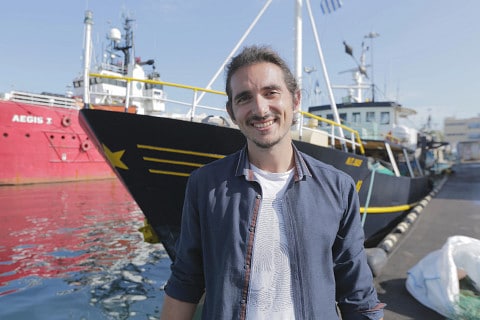
Split, Croatia, 27 September 2021 – Lefteris Arapakis, a national of Greece, has received the honorary title of Ambassador for the Mediterranean Coast conferred by the Priority Action Programme – Regional Activity Centre (PAP/RAC), a Regional Activity Centre of the UN Environment Programme’s Mediterranean Action Plan.
The announcement was made on 27 September 2021 by Zeljka Skaricic, the Director of PAP/RAC, during an online event organised by the Croatia-based Centre as part of the celebration of the 2021 edition of Mediterranean Coast Day (25 September).
The title of Ambassador for the Mediterranean Coast is conferred to individuals who inspire, through their work and engagement, the people from the Mediterranean and beyond, to better understand, protect and respect the coasts and their environment.
In recent years, PAP/RAC has bestowed the title to an array of personalities ranging from actors and Mediterranean country officials to writers and sailors. “The decision to award the title to Lefteris Arapakis is an acknowledgement of his remarkable contribution to a cleaner Mediterranean,” said Ms. Skaricic.
Mr. Arapakis, who was announced as UNEP Young Champion of the Earth for Europe in 2020, hails from a family of fishers. He has witnessed from an early age boats around his hometown of Piraeus (a sea-side suburb of Athens, Greece) hauling in nets filled with litter instead of fish. The plastic rubbish was then thrown back in the sea instead of being disposed of properly. He decided to act.
In 2016 Lefteris Arapakis co-founded Enaleia, the first professional fishing school in Greece. His objectives were to instil environmentally friendly practices in the profession, and to motivate the fishers to collect discarded plastic they encounter in the Mediterranean. Thanks to this endeavour, the fishers affiliated to his social enterprise remove about 20 tonnes of plastic from the sea every month. A partnership with an organization based in the Netherlands allows for the recycling of discarded fishing nets (the most common by-catch) into carpets, socks, masks and other consumer products.
As Mrs Skaricic emphasized: “The Mediterranean is one of the most marine-litter-affected regional seas. Discarded single-use plastics are notoriously ubiquitous. Marine litter has adverse and far-reaching environmental and socio-economic impacts, including on human health. The problem is rooted in unsustainable consumption and production patterns. Through the Regional Plan on Marine Litter devised in the context of the Convention for the Protection of the Marine Environment and the Coastal Region of the Mediterranean (Barcelona Convention), we are promoting the use of available tools and approaches for the removal of marine litter from the seafloor – we call it Fishing for Litter (FfL), and it includes the retrieval of abandoned, lost or otherwise discarded fishing gear. “Fishing for Litter” offers many benefits of the environmental, social, economic and scientific kind. The inspiring work that Lefteris Arapakis is doing with Enaleia is important and relevant, as it successfully demonstrates that individual and local initiatives driven by passion and shared priorities are crucial in complementing action taken at the regional level.”
“We are convinced that Mr. Arapakis’s enthusiasm and the sense of initiative will make Lefteris an excellent Ambassador for the Mediterranean coast,” Ms. Skaricic concluded.
Notes for editors:
Mediterranean Coast Day (25 September) is a UNEP/MAP regional annual observance introduced under the Integrated Coastal Zone Management (ICZM) Protocol of the Barcelona Convention. PAP/RAC is the promoter of this important observance for the Mediterranean.
The slogan of Mediterranean Coast Day (introduced in 2020) is “The Mediterranean needs you. If you put a seashell to your ear, you will hear it calling”.
The date of 25 September was selected to commemorate the first ratification of the ICZM Protocol by Slovenia. Now more than ever, commitment to compliance and enforcement of the instruments adopted under the Barcelona Convention and its Protocols is critical to the region’s efforts to recover better in the post-COVID era.
From its initial focus on ICZM, Mediterranean Coat Day has evolved to embrace a broader range of themes pertaining to the health of coastal and marine ecosystems in the context of sustainable development.